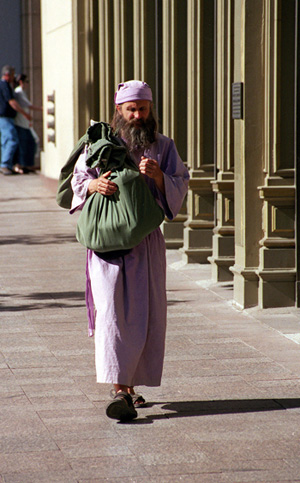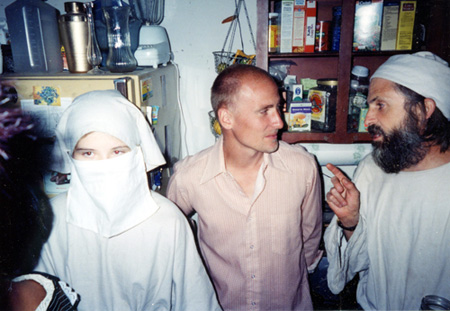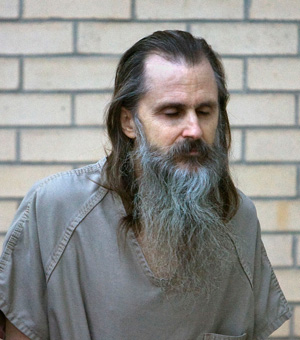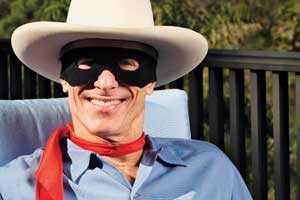
Joy Gough/Zumapress.com
Temple Square attracts religious wackos like moths to a flame. They stand outside the wall yelling condemnations, calling for repentance, quoting from the Bible. Or they pose quietly in costumes, such as the young man with his face painted silver and dressed as Little Bo Peep. Or Worm, who sat naked below the Brigham Young statue with the letters W-O-R-M tattooed across his forehead. Or Brian David Mitchell, the man who dressed like Jesus Christ and stole 14-year-old Elizabeth Smart from her bed in the middle of the night. We knew him as a temple moth and thought he was crazy but harmless. This is why we didn’t suspect him, even when he walked around downtown with Elizabeth in tow, her face covered by a veil. It’s about the strangest thing that’s ever happened in Salt Lake City, and it could only have happened here, in this place and time, perhaps caused by the aura emanating from the temple itself.
“Hearken! Oh ye inhabitants of the earth. Listen together and open your ears, for it is I, the Lord God of all the earth, the creator of all things that speaketh unto you…”
So opens the 27-page prophesy of Immanuel David Isaiah, the name Mitchell adopted once he realized he was the messenger of God, the new prophet on Earth.
“…I have raised up my servant Immanuel David Isaiah, ever my righteous right hand, to be a light and a covenant to my people—to all those who will repent and come unto me, for in my servant, Immanuel is the fullness of my gospel…
In the prophesy, God proclaims Immanuel to be “the one mighty and strong” called to set His house in order before the Apocalypse, a task requiring the aid of seven times seven virgin wives, plus one. His legal wife at the time, Wanda Barzee, carefully transcribed the prophesy in long hand and made copies to circulate among family and friends.
 Brian David Mitchell and Wanda Barzee in 2003. Salt Lake City Police Dept/Zumapress.comThen they abducted their first virgin, Elizabeth Smart, and took her, on foot, up into the hills above her home in Federal Heights, where they had a camp in some scrub oak. There, that first night, Mitchell performed a sacred wedding ceremony, and then he raped her.
Brian David Mitchell and Wanda Barzee in 2003. Salt Lake City Police Dept/Zumapress.comThen they abducted their first virgin, Elizabeth Smart, and took her, on foot, up into the hills above her home in Federal Heights, where they had a camp in some scrub oak. There, that first night, Mitchell performed a sacred wedding ceremony, and then he raped her.
She was abducted June 5th, 2002, and she was gone for nine months.
It happened in my neighborhood, so I remember it. I didn’t know her but my son went to grade school with her and we had a photo of the two of them together at a birthday party—she was a princess and he was a cowboy. She was taken from her bedroom in the middle of the night, and everyone was terrorized. If this could happen to the Smart family, then no one was safe. Their multi-million-dollar home represented the core values of Mormon traditions. Their extended family reached back to the original pioneers and into the present day church hierarchy. It was like 9/11, only the news spread by telephone instead of TV—women calling women and the men saying ‘What? What happened?’
A man took Elizabeth from her bed.
It was the beginning of summer and unusually hot, the air above the valley standing still, loud crickets in the backyard that would not shut up. A valley of hearts cracked open.
Thousands of volunteers combed the neighborhood, looking in window wells, going through stacks of wood. They covered the foothills in broad lines, calling her name. I didn’t volunteer because I didn’t think I could handle that part, hearing her name called out.
The police arrested a suspect, Richard Ricci, but the poor man died while in custody from a ruptured artery in his brain. He didn’t take Elizabeth, no one but the police thought he was the guy.
Through the summer Elizabeth’s photo hung in every window of every shop and on every lamp post. Her father and her family appeared regularly on local, national and international news programs, begging and weeping for her safe return. It seemed she was hidden somewhere far away, somewhere just beyond the broadcasting spectrum, or like in The Wizard of Oz where Dorothy’s family calls to her through the crystal ball.
Then, when she was found nine months later, in March of 2003, we realized she’d actually been right here in front of us, walking around downtown, reading in the library, eating in fast-food restaurants, and going to parties with Mitchell and his wife, Wanda Barzee. From June until August they hid out in their camp in the scrub oak up in the foothills, avoiding the search parties. Then they began coming down into the city by day, passing within a quarter-mile of Elizabeth’s home. They walked the streets dressed as religious pilgrims from the New Testament. Mitchell had a long beard and a walking stick. Elizabeth and Wanda covered everything but their eyes. And no one figured it out.
 Elizabeth Smart (then 14) on left with her sister and mother in 2002, the year she was kidnapped. Joy Gough/Zumapress.comIn late October they got on a bus and went to San Diego, where they spent the winter, also camping out. In March of 2003*, they came back to Salt Lake, and this is when Elizabeth was discovered walking down State Street wearing a grey wig and sunglasses. The first thing she said to the police was, “I know who you think I am. You guys think I’m that Elizabeth Smart girl who ran away.”
Elizabeth Smart (then 14) on left with her sister and mother in 2002, the year she was kidnapped. Joy Gough/Zumapress.comIn late October they got on a bus and went to San Diego, where they spent the winter, also camping out. In March of 2003*, they came back to Salt Lake, and this is when Elizabeth was discovered walking down State Street wearing a grey wig and sunglasses. The first thing she said to the police was, “I know who you think I am. You guys think I’m that Elizabeth Smart girl who ran away.”
Mitchell was arrested, and procedures began to determine whether he was competent to stand trial—basically, whether he was sane enough to understand what was happening. After six years of trying unsuccessfully to determine this question in state court, the federal court took over in the fall of 2008, ordering new psychological evaluations. This whole delay was very annoying. It seemed crazy we couldn’t determine whether Mitchell was crazy, and there were other questions, important questions, no one was talking about. Like, for instance, “Why didn’t she run away or cry out for help?” And, “Why we didn’t recognize her—how was she able to stand right in front of us and become invisible?”
You’d think it wouldn’t be so hard to answer these questions, but for us it’s like groping about in a dark room—we know the answers are here somewhere, but we just can’t find them. Or, actually, it’s that we don’t even want to ask the questions, because we know the answers don’t make sense, at least not to the rational mind. Yes, we’re uncomfortable with the questions and the answers because they don’t make sense in a court of law. They only make sense in and around the temple. To understand how this works, we need to go back in time, back to the beginning of the Mormon Church.
When Joseph Smith was a boy, circa 1820, his family moved from New Hampshire to the “burnt over district” of western New York. The area earned this name because it was so full of Christian evangelists preaching revivalism as to have no fuel (people) left to burn (convert). Joseph, age fourteen, went to the woods, knelt down, and began to pray to God, asking Him which religion is true. God appeared to Joseph as a light brighter than sun and told him all religions had become corrupted, and that he, Joseph, had been chosen to be the new prophet and restore the true gospel. Ten years later, in 1830, Joseph published the Book of Mormon, establishing a new church and a new people, the Latter Day Saints, or Mormons.
 The Salt Lake Temple. WikimediaIn the early days of the Church, Joseph Smith taught his followers that there was only a thin veil separating this temporal plane from the celestial realm, and that by praying in the proper manner and performing certain rituals they could part the veil and have magical and mystical experiences with angels and gods and demons who had human bodies filled with white spirit fluid instead of blood. Yes, according to Joseph Smith, there was and is more than one god and more than one devil. He said we have only one Heavenly Fatherc and he is a god, but there are many other gods with their own planets in other places of the universe. Joseph told his followers, in essence, “There are gods and angels among us, and I have contacted them; they are my friends. You can know them, too, if you only follow my instructions.”
The Salt Lake Temple. WikimediaIn the early days of the Church, Joseph Smith taught his followers that there was only a thin veil separating this temporal plane from the celestial realm, and that by praying in the proper manner and performing certain rituals they could part the veil and have magical and mystical experiences with angels and gods and demons who had human bodies filled with white spirit fluid instead of blood. Yes, according to Joseph Smith, there was and is more than one god and more than one devil. He said we have only one Heavenly Fatherc and he is a god, but there are many other gods with their own planets in other places of the universe. Joseph told his followers, in essence, “There are gods and angels among us, and I have contacted them; they are my friends. You can know them, too, if you only follow my instructions.”
Lots of people at the time—living on the frontier, surrounded by stumps and mud, so alone on the big continent—thought it was a good idea. Joseph’s followers began speaking in tongues and healing the sick and having visions and revelations. They pitied members of other faiths who did not have these experiences, and thought this alone was proof Joseph Smith had indeed restored the gospel on earth.
Everything went fine until Smith’s right hand man, his “assistant president,” Oliver Cowdery, began speaking directly to God, our Heavenly Father, and God told him how Joseph Smith had become corrupt and now he, Oliver Cowdery, was the new prophet who held the keys to the kingdom of heaven. Joseph responded by saying Cowdery had not been speaking to God but to Satan, and he excommunicated him.
After that, Joseph prophesied that a member of the church can only receive personal revelation concerning matters within his own “stewardship,” his own domain of authority and control. Therefore, if a man has a wife and children, he may receive revelation from God concerning decisions he must make about his wife and children, and they must obey him—just as he must, in turn, obey those men in higher positions of the church hierarchy, all the way up to the Prophet, who has stewardship over every member of the church.
In this way, obedience to authority became the flip side of prophesy, visions, and speaking in tongues. This is the razor’s edge of Mormonism. You are supposed to seek the truth by having direct mystical experiences with spirits and supernatural forces, while at the same time blindly following orders coming down through a social bureaucracy. Many, especially in the early days, didn’t like these lines of authority and control and chose to contact the spirit world directly. In 1909, the sixth president of the Church, Joseph F. Smith, wrote:
There never was a time, perhaps, when there were more false prophets than there are today,… We get letters from them, and commands and threats from them, and admonitions and warnings and revelations from them, nearly every day. .. some calling themselves “deliverers of Israel,” some calling themselves “the one mighty and strong, who is to deliver Israel out of bondage.“… We have these letters —those that we have not destroyed—stacked up almost by the cord. Some of these false prophets, these men to “deliver Israel,” and these foolish, unwise, unstable creatures, led about by every wind of doctrine have risen right in our own midst. (LDS Conference Report, October 1909, p. 9)
In the modern Mormon Church, contact with the spirit world is managed through rituals enacted in the temple. Inside, there are rooms depicting the world before and after the Fall of Man. Then there is the Celestial Room, which depicts the highest realm of heaven. Inside the Celestial Room there’s a smaller room called the Holy of Holies, and when the Prophet of the Church wants to talk to God, he goes inside the Holy of Holies. There he receives revelation concerning Church doctrine and affairs. Everyone else stays in the Celestial Room and performs the sacred ritual of being “pulled through the veil.”
There’s an actual veil there, and live actors portraying God, resurrected beings, and the apostles John, Peter, and Paul. They reach through the veil and pull patrons across to the other side, the Celestial Kingdom. This is a very sacred and very real thing for Mormons, like a trip to heaven and back. However, in order to get into the temple you have to have a recommendation from your bishop, and to get a recommendation you have to be a member in “good standing,” and to be in good standing you must follow a lot of rules. Most Mormons try to follow the rules, and most can get a temple recommendation, if they want.
Mormons still believe in personal revelation, but Church authorities now tend to downplay direct communication with God and instead encourage communion with the Holy Ghost, a warm and fuzzy experience sometimes described as a “burning in the bosom.” In order to survive and grow, the Mormon Church has become progressively more mainstream and status quo; for instance, they now allow black men to hold the priesthood and no longer practice “blood atonement” rituals in the temple. In 1996, President and Prophet Gordon B. Hinckley told Mike Wallace on 60 Minutes, “We’re reaching out across the world. We’re not a weird people.”
Still, sometimes there are “weird” ones among them, such as Brian David Mitchell’s father, Shirl Mitchell, who not only received word from God that he is the Christ, but then transcribed visions and revelations revealing an entirely new cosmology, which he combined into a 900-page manuscript called Spokesman for the Infant God or Goddess. According Mormon historian John-Charles Duffy (perhaps the only person who’s ever read the manuscript):
Shirl teaches that human beings collectively constitute the body of an infant deity, just as cells constitute our own bodies. The infant deity—the offspring of the sun, who is a goddess, and a male companions star—has been gestating over the last several million years of human evolution and is now ready to be born. This birth will occasion a radical transformation in society. In the new age following the birth of the infant deity, people will follow an all-natural vegetarian diet. Children will engage in erotic play without repression; teenagers will freely copulate for the purpose of procreation; and adults, having sexually satiated themselves during childhood and adolescence, will live in celibate ecstasy. … Shirl writes of the “addictive voyeurism” that had him fondling young girls as a child and peeping into women’s windows as an adult. He complains that every woman is a manipulative nymphomaniac whom no husband could possible satisfy; he fears that his penis could be “strangled” during sex; he is fascinated by a recurring dream in which a shaft of light penetrates his anal chakra. Accused by his former wife of rape, Shirl defends himself by insisting that when rape occurs in marriage, it’s because wives withhold sex from their husbands and that there can be no “illegal rape” in a marriage anyway. (“The Making of lmmanuel,” Sunstone, Oct. 2003, p. 36.)
Shirl and his wife had six children, and Brian David was the third, born in 1953. They lived in a middle-class suburban neighborhood at the base of the Wasatch Mountains. As a child, Brian was a Cub Scout and played sports and went to church on Sundays, but when he was 16, according to his father, Brian was found guilty of exposing himself to a child and sent to a juvenile delinquent hall. At 19, he impregnated a 16-year-old girl and then married her. They had two children, then got divorced. He married again, to a woman who had three kids already and together they had two more. Then they got divorced. Then his ex-wife, Debbie Mitchell, accused him of sexually molesting their children. Then he married a woman eight years his senior, Wanda Barzee, who had six children.
Until he was nearly 30 years old, Mitchell moved in and out of the Church, sometimes professing to be an atheist. Then, according to Derrick Thompson, Mitchell’s stepson, he ate a large dose of LSD out in the Utah desert and realized God wanted him back in the Mormon Church. So, with his third wife, Wanda Barzee, he set out to become a member in good standing. He worked as a die-cutter in a jewelry store; she studied the organ, hoping to someday play in the Tabernacle. He became the second councilor to the bishop, a member of the church hierarchy, and volunteered to work in the temple as a live actor.
In the Salt Lake Temple, there’s a ritual known as “the endowment,” where volunteer actors portray characters from the Old Testament and present, in dramatic form, the story of man’s fall from grace in the Garden of Eden. According to a friend at the time, Doug Larsen, Mitchell played Satan, a part that required him to loudly proclaim that he is the incarnation of evil and has bought up armies and popes to work his will upon mankind. Mitchell loved this part and even bragged that his temple coworkers had told him, “You’re one of the best we’ve ever had, but can you tone it down a little bit?”
After this, Mitchell and Barzee quit their regular jobs in Salt Lake and hit the road, hitchhiking around the country for two years as itinerant preachers. When they returned in 1997, they were wearing costumes of religious pilgrims and insisting their friends and family call them by their new names—Immanuel David Isaiah and God Adorneth.
 Brian David Mitchell was a well known fixture in Temple Square. Brian Johnson/Zumapress.com
Brian David Mitchell was a well known fixture in Temple Square. Brian Johnson/Zumapress.com
Mitchell became a well-known beggar and pest around the downtown area, standing outside the shopping mall across the street from Temple Square, sometimes cursing people if they didn’t give him money, or spreading his arms, portraying Jesus suffering on the cross. In April of 2002, he finished his 27-page revelation, The Book of Immanuel David Isaiah, and gave copies to friends and relatives. Somehow Church authorities obtained a copy, and in the beginning of June 2002, the same week he took Elizabeth Smart, Brian David Mitchell was excommunicated.
This may sound like a strange story to people who are not from around here, but everything that happened in Mitchell’s life, at least up to where he kidnapped Elizabeth, is not that unusual within the Mormon community. Most Mormons do not have visitations and revelations, but some still do, and when it happens, there tend to be dramatic consequences.
For example: In 1993, while LDS Apostle Howard Hunter was addressing 15,000 BYU students in their basketball arena, a young man named Cody Judy appeared on stage and stood behind Hunter with a briefcase he said contained a bomb. He gave Hunter a three-page letter describing how God had made him, Cody Judy, the new prophet of the Church. He told Hunter to read it or he would blow everybody up. There was no bomb in the briefcase, only a Book of Mormon. Judy was taken to the state mental hospital, where he jumped from his third-story window and escaped into the mountains. For three weeks he traveled “like a deer,” fearing a massive manhunt. Then, suddenly, he showed up at the Church-owned television station and asked for some airtime on the news. Then he spent eight years in prison, and when he got out he worked in a video store and ran for public office. Now he has a Facebook site.
I had a friend in high school who was a gifted athlete and a charming young man. His family lived down the street from mine, next to the Salt Lake Country Club. Late one summer night, he burst into my bedroom, very frightened. He said he’d been making out with his girlfriend on the ninth green and his guardian angel appeared in a glowing light above a sand trap. The angel told him to take his hand out of his girlfriend’s pants and not to put it back, ever again. At the time, no one mentioned schizophrenia. We all thought it was just part of being a Mormon—even when he attacked his father because he thought he was the Devil, even when he would go down to Temple Square and walk up to young women and tell them that God had just told him they were to be married in the Celestial Kingdom. We thought this was strange, but not necessarily out of the ordinary. His family sent him on a mission, thinking it would be good for him, but it only made him more crazy. He came back and went into the psych ward at the University hospital, where they put him on heavy medication. He struggled with a marriage and numerous low-paying jobs and volunteered as a live actor in the temple, portraying “Heavenly Father Behind the Veil,” but his health went downhill fast and he died at age 29 due to organ failure from all the medication he was taking.
Then there was the group of polygamists in central Utah who claimed to be receiving “unanimous revelations,” where not one but all ten men would receive the same revelation at the same time. Angels and apostles and resurrected beings had appeared to them, and they had seen and heard many wonderful things. For instance, they were told they were all new prophets and they should start a new church called “the True and Living Church of Jesus Christ of the Last Days,” which they did. Then God told them that they should become polygamists, which they did. Then, unfortunately, God told only some of them that they should sleep with more than one wife in the bed at a time, which they did, and this caused their quorum of 10 apostles to break apart, as some considered the practice to be an abomination unto the Lord.
Prophesy and polygamy often go together. When God speaks to a man and tells him he is the new prophet and must now take charge of the only true church, the next thing He often tells the man is to become a polygamist. This is because one of the responsibilities of being the new prophet is to spread “the seed of David” and produce the new chosen people. This takes a lot of women and a lot of effort.
Many people in Salt Lake City, Mormon and non-Mormon, are opposed to polygamy, but very few are in favor of prosecuting and punishing the crime. This is because there are a lot of polygamists in these parts, and it would be very expensive and socially chaotic to go after them. Polygamy is a long-established part of the local culture, and, then, we all live in something that resembles a polygamous culture, where affairs and serial monogamy are common. So who will be the first to throw a stone? And what will become of it?
In this way, we tolerate polygamy, apparently even among crazy homeless people dressed as characters out of the New Testament. People who saw Mitchell walking around downtown with Wanda and Elizabeth in tow assumed he had taken a young polygamist wife, and nobody questioned him about it, even though the new wife looked very young.
All that separated her from us was the veil she wore over her nose and mouth. If she would have taken off the veil, we would have recognized her. We thought she had either been killed or was being held against her will by someone like a monster. No one imagined that she would be walking around with a man who thought he was Jesus Christ.
Although her father now denies it, Elizabeth may have been suffering from the Stockholm Syndrome, also known as terror or trauma bonding, a phenomena in which victims display compassion for and even loyalty to their captors. It’s common in cases of abused children, battered women, prisoners of war, cult members, incest victims, and concentration camp prisoners. The victim feels intense fear of physical harm. All control is in the hands of the captor. If the captor then shows the victim some kindness, the victim often begins to support and sympathize with the abuser’s reasons and behaviors, even at times helping him and not trying to escape. In the late ’70s, Patty Hearst was kidnapped by the Symbionese Liberation Army, and then help them rob a bank. Jaycee Lee Dugard was kidnapped in 1991 when she was 11 years old by Phillip Craig Garrido, with whom she eventually had two daughters. When she was found in 2009, she told the authorities that Garrido was a “great person” who was “good with her kids.”
Stockholm Syndrome seems like a good explanation for why Elizabeth didn’t cry out or run away, and perhaps Elizabeth’s father, Ed Smart, now denies this explanation because he is unwilling to accept that Elizabeth ever supported or sympathized with Mitchell, let alone that she believed he was the new prophet. Elizabeth has testified in federal court that she saw Mitchell as “evil, wicked, manipulative, sneaky, slimy, selfish, greedy, not spiritual, not religious, and not close to God.” She said Mitchell threatened to kill her and her family if she ran away. But, really, there were many opportunities, in public, where all she had to do was take off the veil…unless she believed Mitchell actually had magical powers. And maybe he did.
 Elizabeth Smart wearing a veil to conceal her identity at a party in Salt Lake City with her captor, Brian David Mitchell (far right). Anne Elizabeth Maurer/Zumapress.comIn late August, the threesome went to a party thrown by a gang of bohemians just down the hill from Elizabeth’s home. It can get quite hot here in August during the day, but the nights are enjoyable. I imagine Mitchell and Barzee and Elizabeth had been walking around town all day in the heat and were on their way back up to the foothills on a cool evening, and they passed by a house with a party going on, so they crashed it. Mitchell liked to drink beer, and free beer was hard to pass up. The house had a nickname, China Blue, and a reputation for wild parties with people often coming in costume, so the pilgrim robes and polygamy theme didn’t seem that out of place. The host of the party, a man named Bub, told me he was a little perplexed that this guy who was spouting religious doctrine was also pounding down a lot of beer. He said somebody pulled out some homemade absinthe and Mitchell tried to get Elizabeth to drink some, but she refused to swallow it.
Elizabeth Smart wearing a veil to conceal her identity at a party in Salt Lake City with her captor, Brian David Mitchell (far right). Anne Elizabeth Maurer/Zumapress.comIn late August, the threesome went to a party thrown by a gang of bohemians just down the hill from Elizabeth’s home. It can get quite hot here in August during the day, but the nights are enjoyable. I imagine Mitchell and Barzee and Elizabeth had been walking around town all day in the heat and were on their way back up to the foothills on a cool evening, and they passed by a house with a party going on, so they crashed it. Mitchell liked to drink beer, and free beer was hard to pass up. The house had a nickname, China Blue, and a reputation for wild parties with people often coming in costume, so the pilgrim robes and polygamy theme didn’t seem that out of place. The host of the party, a man named Bub, told me he was a little perplexed that this guy who was spouting religious doctrine was also pounding down a lot of beer. He said somebody pulled out some homemade absinthe and Mitchell tried to get Elizabeth to drink some, but she refused to swallow it.
A couple of young women at the party started talking to Elizabeth. The women could only see her eyes, but they thought she looked uncomfortable and asked her if she was okay, if she needed any help, but she wouldn’t talk to them. Mitchell then came up and pulled her, by the arm, into another room. This upset Bub and his friends, and they confronted Mitchell on his harsh treatment of the young woman. Under attack, Mitchell jumped up on a chair and started hurling fire and brimstone at the guests, invoking scripture and the power of the Lord and damning them all to hell—perhaps in the voice he perfected while portraying Satan in the temple. He was still yelling as they pushed him out the door. Then he stood in the front yard and yelled some more before taking his women and going home, back to their camp high in the foothills.
Bub told me he felt kind of dumb when he realized the girl he was trying to protect was Elizabeth Smart, thereby missing the $250,000 reward. He said, “It was very mysterious, the whole scenario, almost like he was using black magic to build a psychic fence around the situation.”
The legal definition of insanity rests upon the question of whether the accused understood the nature and quality of the act he was doing, or that he did not know he was doing something wrong. I think we should apply this test to Mitchell on that August night as he stood in the yard on Second South and condemned the partiers at China Blue. Here is a man who has abducted and raped a young girl, and she has a quarter-million-dollar reward on her head, and he is raving, late at night, condemning people to hell in a front yard less than a mile from her home. Did he understand the nature and quality of this act? I think he thought he was the prophet, acting in God’s name. Did he know it was wrong? I think he thought it was right, if not absolutely necessary. So he was insane, for sure.
But then what about the time, shortly after the party on Second South, when Mitchell, Barzee, and Elizabeth were confronted by a homicide detective in the library downtown? The detective had been told of a report that Elizabeth Smart was in disguise at the library. He approached the three and asked Elizabeth to take off her veil, but Mitchell stepped in and somehow Jedi mind-tricked the officer into backing off and leaving them alone by telling him Elizabeth was his daughter and it was against their religion for her to show her face or speak in public. The officer said Mitchell stayed calm through 15 minutes of questioning, and so he could find no reason for doubt or suspicion. In this scenario, Mitchell clearly understood the nature and quality of the situation and that what he was doing was wrong, because he was able to lie about it, successfully, to a detective who was looking for him. So he was not insane, for sure.
The trial of Brian David Mitchell began in the first week of November 2010. The charges were kidnapping and sexual trafficking of a minor across state lines, but not rape (perhaps because the punishment for aggravated kidnapping—physical harm or death—is life imprisonment). As he had done in the past, during preliminary hearings in both state and federal courts, Mitchell entered the courtroom singing a Mormon hymn. There were pews for the spectators, elaborate wood paneling on the walls, carpet, chandeliers, and an elevated altar-like bench for the judge. The Smart family, including Elizabeth sat on the front row, with journalists from around the country filling in the pews behind. We sat there, in stone cold silence, and listened to Mitchell sing, eyes closed, waiting for the judge and the jury. I hate to say this, but he had a sweet voice, even with some soul. Elizabeth’s face was blank, her body stiff. When she was 14, he sang to her in the foothills—summer nights, looking down on the city and her home. Now she was 23, hearing the same songs in a federal courtroom that feels more like a church. At least, it felt like a church to me, the members sitting still and quiet, full of sorrow and fear, waiting for the service to begin.
The judge came in, the jury came in, and Mitchell kept singing, so the judge ordered that he be taken out and put in a room where he could watch the trial on a television. In their opening arguments, the prosecution and the defense told the jury that the facts in the case were not in question: Both sides agreed Mitchell had taken Elizabeth at knifepoint and held her captive and raped her many times. The only question for the jury to decide would be whether Mitchell was insane at the time he committed these crimes. In other words, did Mitchell really believe he was the prophet?
The prosecution’s strategy was to show that Mitchell could change his persona at will, such as when he was confronted by the homicide detective, and was therefore a narcissistic and sadistic actor who manipulated people in order to obtain sex with children. For instance, they called Mitchell’s stepdaughter from his marriage with Wanda, and she testified how, when she was 14, Mitchell cooked her pet rabbit for dinner and fed it to her saying it was chicken, and that he also made her look at pornography while he prayed. The defense lawyers, public defenders, brought in psychiatrists who had examined Mitchell and concluded he was a delusional schizophrenic, an insane man who believed he was talking to God. The prosecution countered this by calling experts in religion who argued that talking to God is common among Mormons, and therefore not insane. One of these experts, a BYU scholar, estimated that there are at least 200 men in Utah and the surrounding states who also believe they are “the one mighty and strong.”
 Brian David Mitchell at the federal courthouse in Salt Lake City. Al Hartmann/Zumapress.comTo argue this point, the defense could have proposed that it’s never normal or sane to believe you’re the prophet of God, not even for Joseph Smith. They could have pointed out that Mitchell, in his delusions, was emulating Smith, who had two 14-year-old wives, among many others. But the defense did not go there, perhaps because the judge and most of the jury and most of the people outside the courtroom were Mormons and would have been deeply offended. I think it was also because they knew, after the first day of testimony, they were going to lose.
Brian David Mitchell at the federal courthouse in Salt Lake City. Al Hartmann/Zumapress.comTo argue this point, the defense could have proposed that it’s never normal or sane to believe you’re the prophet of God, not even for Joseph Smith. They could have pointed out that Mitchell, in his delusions, was emulating Smith, who had two 14-year-old wives, among many others. But the defense did not go there, perhaps because the judge and most of the jury and most of the people outside the courtroom were Mormons and would have been deeply offended. I think it was also because they knew, after the first day of testimony, they were going to lose.
Elizabeth Smart was the third witness called by the prosecution, following her sister and her mother. She took the stand and told the jury, looking straight at them, specifically how Mitchell had raped her that first night, describing how he tried to force entry from above, and when that didn’t work he rolled her over and did it from behind. Then she told how he made her watch Wanda give him a blow job so she’d know how to do it. She said Mitchell would go into town and bum enough money to buy alcohol and she’d get drunk just to get through the sex, which was daily. She spoke with a strong voice that never faltered, no tears or sign of guilt or shame, telling the story of her trip to hell and back. After this kind of imagery, the jury wasn’t going to care about what Mitchell believed he was doing. The trial took almost five weeks, but really it was over on the first day.
On December 10, the jury found Brian David Mitchell guilty, without reason of insanity, sending him to spend the rest of his life in a federal penitentiary with other kidnappers, rapists, and killers. Let him sing for them.














